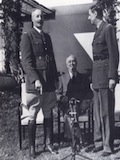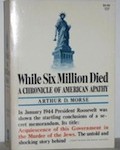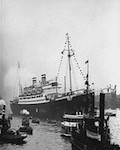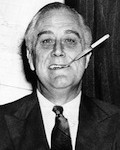On November 8, 1942, American and British forces, under the command of U.S. General Dwight Eisenhower, invaded Nazi-occupied Morocco, Algeria, and Tunisia. It took the Allies just eight days to defeat the Germans and their Vichy (pro-Nazi) French partners in the region.
For the 330,000 Jews of North Africa, the Allied conquest was heaven-sent. The Vichy regime that had ruled since the summer of 1940 had stripped the region’s Jews of their civil rights, severely restricted their entrance to schools and some professions, confiscated Jewish property, and tolerated sporadic pogroms against Jews by local Muslims. In addition, thousands of Jewish men were hauled away to forced-labor camps. Now, it seemed, all that was about to change. President Roosevelt, in his victory announcement, pledged “the abrogation of all laws and decrees inspired by Nazi governments or Nazi ideologists.”
But there turned out to be a discrepancy between FDR’s public rhetoric and his private feelings. Among those taken prisoner on the first day of the battle was Admiral Francois Darlan, a senior leader of the Vichy French regime. In exchange for Darlan ordering his forces in Algiers to cease fire, President Roosevelt agreed to leave Darlan in charge of the newly-liberated North African territories. Many of FDR’s supporters back home were appalled at the president’s alliance with a prominent Nazi collaborator. “[It] sticks in the craw of majorities of the British and French, and of democrats everywhere, [that] we are employing a French Quisling as our deputy in the government of the first territory to be reoccupied,” an editorial in The New Republic complained.
The Darlan government was in no rush to give the Jews equal rights. Neither was President Roosevelt. On January 17, 1943, FDR met in Casablanca with Major-General Charles Nogues, one of the leaders of the new “non-Vichy” Darlan regime. When the conversation turned to the question of rights for North African Jewry, Roosevelt declared: “The number of Jews engaged in the practice of the professions (law, medicine, etc) should be definitely limited to the percentage that the Jewish population in North Africa bears to the whole of the North African population…The President stated that his plan would further eliminate the specific and understandable complaints which the Germans bore toward the Jews in Germany, namely, that while they represented a small part of the population, over fifty percent of the lawyers, doctors, school teachers, college professors, etc., in Germany, were Jews.” (It is not clear how FDR came up with that wildly exaggerated statistic.)
The Allies permitted nearly all the original senior officials of the Vichy regime in North Africa to remain in the new government. The Vichy “Office of Jewish Affairs” continued to operate, as did the forced labor camps in which thousands of Jewish men were being held.
American Jewish leaders were reluctant to publicly take issue with the Roosevelt administration, but by the spring of 1943, they began speaking out. The American Jewish Congress and the World Jewish Congress charged that “the anti-Jewish legacy of the Nazis remains intact in North Africa” and urged FDR to eliminate the Vichy laws. “The spirit of the Swastika hovers over the Stars and Stripes,” Benzion Netanyahu, director of the U.S. wing of the Revisionist Zionists (and father of a future Israeli prime minister) charged. A group of Jewish GIs in Algiers protested directly to U.S. ambassador Murphy. Editorials in a number of American newspapers echoed this criticism.
At first, Roosevelt administration officials dug in their heels. Undersecretary of State Sumner Welles insisted that, technically, the region was no longer under Allied military occupation and the U.S. could not dictate how the local government ran things. Technically, Welles was correct, but in practice America had significant influence over the Darlan government’s policies. Eventually, after numerous public protests, the Roosevelt administration agreed to make it clear to the local authorities that the anti-Jewish measures needed to be repealed.
The implementation process, however, was painfully slow. In April 1943, the forced labor camps in North Africa were officially shut down, although some of them continued operating well into the summer. The Jewish quotas in schools and professions were gradually phased out. In May, the racial laws in Tunisia were abolished. Two hundred Italian Jews who had been taken by the Allies to a Tunisian forced labor camp, because they were citizens of an Axis country, were released after several months. On October 20, 1943, nearly a year after the Allied liberation, full rights for North Africa’s Jews were at last reinstated.
Sources: Medoff, FDR and the Holocaust, pp.22-25;
Abitbol, The Jews of North Africa during the Second World War, pp. 159-164.











